08/01/18
K-State Current - August 1, 2018
K-State Current is a weekly news update for the Kansas Board of Regents to apprise the Regents on a few of the many successes and achievements made by K-State faculty, staff and students.
K-State News
Kansas State University launches new graduate degree in data analytics
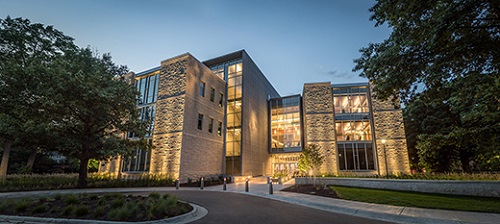 In an effort to meet demand in one of the fastest growing job markets in the world, the College of Business Administration is launching a Master of Science in data analytics in fall 2018.
In an effort to meet demand in one of the fastest growing job markets in the world, the College of Business Administration is launching a Master of Science in data analytics in fall 2018.
Data analytics is a rapidly growing interdisciplinary field that involves collecting, processing and analyzing large data sets. Analysts then effectively communicate research findings to key decision-makers who use the data to strategize changes or solve problems in their companies or institutions
Career prospects for professionals with advanced degrees in data analytics are excellent, as there are currently more job opportunities than graduates in this high-demand field. According to a recent report by IBM, demand will only continue to grow, with a predicted 28 percent increase in total jobs for U.S. data professionals by 2020.
"As many real-world problems are becoming more complex than before, data- and algorithm-driven decision-making emerges as an increasingly important approach in academia, industry and government," said Chwen Sheu, associate dean for academic programs in the College of Business Administration. "As a result, data analytics is becoming one of the most essential skills for professionals in social science, business, education and engineering."
To meet the demand for this high-growth area, the College of Business Administration has partnered with six departments from across campus — computer science, economics, geography, industrial manufacturing systems engineering, mathematics and statistics — to offer the first graduate program in the state of Kansas focused on data analytics. This unique degree program combines courses from various disciplines that cover both data science and applied analytics. Such an integrated curriculum offers students flexibility in choosing a track that fits their interests and background.
The program will foster community engagement through course projects, and seeks out research opportunities to provide evidence and data that can be shared with the state of Kansas. Students in the program will also have the opportunity to work directly with College of Business Administration faculty research projects in data analytics.
"All industries can benefit from employees with advanced data analytics skills," Sheu said. "We want to provide our students with the tools and knowledge they need to take their careers to new heights as leaders in their organizations."
In addition to introducing the new graduate degree in data analytics, the College of Business Administration recently has also upgraded its MBA curriculum by reducing the number of credit hours from 45 to 36, increasing student scholarship support, adding joint degree programs, and enhancing its collaboration with the business community.
For more information about the Master of Science in data analytics, including curriculum and tuition information is available at cba.k-state.edu/students/graduate/data-analytics/ or by contacting Lynn Waugh at lwaugh@k-state.edu.
Executive Education by Kansas State University launching new program for middle managers
Following the 2017 launch of The Executive Coach, Executive Education by Kansas State University is expanding its offerings to include a new program aimed at a new audience: The Strategic Leader.
The Strategic Leader is an educational program focused on equipping middle managers and executives with the tools they need to help their workplaces implement organizationwide change. Participants will gather in Manhattan for two days of group and individual coaching once every two months.
Sessions for the first year of the program focus around the theme of "people leadership," with topics including task leadership, critical conversations and change management. After each session, participants will return to work with actionable goals and the tools required to implement them.
"After working exclusively with executives in our first year, we are pleased to expand this program and welcome in more leaders from the region," said Russell Disberger, owner of Aspen Business Group and facilitator of the program. "This program is specifically tailored to help middle managers make an impact and grow as leaders within their respective organizations."
In addition to the new offering, The Executive Coach is now forming a second group to begin Sept. 13. Executives work in a roundtable setting with coaches and their peers to hone the skills needed to establish and maintain an optimized workplace. The Executive Coach consists of 12 one-day sessions, meeting quarterly over a three-year period in Manhattan. Anyone interested in joining The Executive Coach can sit in for a sample session at the Manhattan Country Club, 1531 N. 10th St., on Aug. 9.
Executive Education by Kansas State University is a special collaboration between K-State Global Campus and Aspen Business Group. These programs are designed for high-level executives, middle managers and emerging business leaders.
For more information on any of the programs offered through Executive Education by Kansas State University, visit exec.k-state.edu.
K-State researchers share water-energy-food nexus work at joint European and NASA workshop
Stacy Hutchinson, professor of biological and agricultural engineering, and Shawn Hutchinson, professor of geography, presented research on July 9-12 at the third Joint European Association of Remote Sensing Laboratories and NASA Landuse/Landcover Change Workshop at the Mediterranean Agronomic Institute of Chania in Chania, Crete, Greece.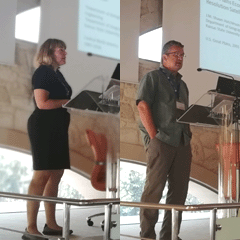
The workshop, hosted in conjunction with the 38th annual EARSeL Symposium, focused on the impact of land use and land cover change on the water-energy-food nexus.
K-State research presentations included "Large Scale Soil Moisture Trend Analysis in the Missouri and Arkansas-Red-White River Basins" by Stacy Hutchinson, Kelsey McDonough and Shawn Hutchinson and "Time Series Analysis of Phenometrics and Long-Term Grassland Trends across the Great Plains Ecoregion Using Moderate Resolution Satellite Imagery" by Shawn Hutchinson and Hilda Onuoha. Co-authors McDonough, Jamestown, Rhode Island, and Onuoha, Abuja, Nigeria, are doctoral students in biological and agricultural engineering and geography, respectively.
K-State Faculty Highlights
Tim Shaffer receives Early Career Recognition Award
Tim Shaffer, assistant professor of communication studies and assistant director of the Institute for Civic Discourse and Democracy, received the 2018 Early Career Recognition Award from the International Association for Research on Service-Learning and Community Engagement at the organization's 18th annual convention in New Orleans earlier this month.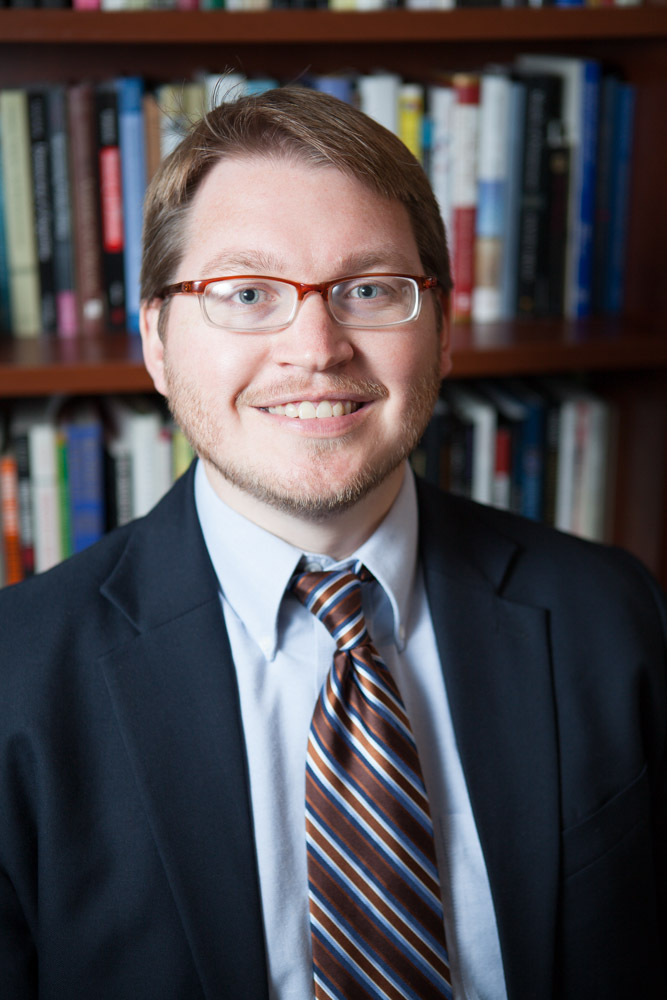
The association is an international nonprofit organization devoted to promoting research and discussion about service learning and community engagement. Shaffer was recognized by the award presenter for being "an immensely talented and influential young public scholar who is a leading researcher in democratic engagement, most especially on the role of deliberative democracy and citizen engagement in higher education and community-based settings. He is a visionary who has already contributed greatly to the field of community engagement and service-learning, and I am convinced he will be a leading scholar for many years to come."
Shaffer's teaching focuses on dialogue and deliberation, democratic communication across difference, small group communication, and leadership communication. He also has been part of a national effort by the Cooperative Extension System called "Coming Together for Racial Understanding," part of the research team at the National Institute for Civil Discourse at the University of Arizona, and serves as associate editor of the Journal of Public Deliberation. His research centers on the advancement of democratic practices through deliberative politics and civic engagement in higher education and other institutional and community settings.
Shaffer has published numerous articles and book chapters and is co-editor of "Deliberative Pedagogy: Teaching and Learning for Democratic Engagement," Michigan State University Press, 2017; "A Crisis of Civility? Contemporary Research on Civility, Incivility, and Political Discourse," Routledge, 2018; and "Jumping into Civic Life: Stories of Public Work from Extension Professionals," Kettering Foundation Press, 2018. Two forthcoming books, "Discussing Democracy: A Primer on Dialogue and Deliberation in Higher Education," Stylus; and "When Democracy Had Roots: Civic Professionals, Group Discussion, and Adult Education in the Rural New Deal," West Virginia University Press, are set to be published in 2019.
K-State faculty hosts first workshop on polymer-derived ceramics funded by NSF
Kansas State University hosted the first polymer-derived ceramics workshop on July 16-18 at the K-State Alumni Center. The workshop is funded by a National Science Foundation Partnerships for International Research and Education, or PIRE, grant.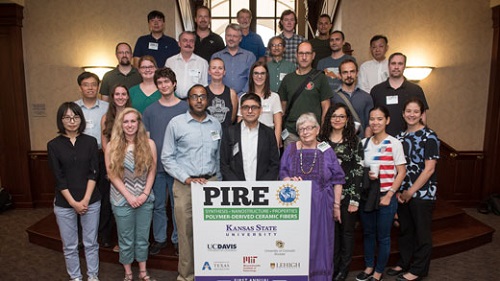
Gurpreet Singh, associate professor in the College of Engineering and principal investigator, was awarded the grant for his work on polymer-derived ceramics, or PDCs, to create super turbines.
Currently, commercially available non-oxide ceramic fibers, which can be used in components for hot sections of gas turbines, are constituted from silicon and carbon developed in the 1970s and are available only from Japan. Basic and applied research on next-generation multi-component polymer-derived ceramic fibers at universities is conducted nearly entirely in Japan and Europe. The PIRE team is concerned that university research in the U.S. is not keeping pace with fundamental research on non-oxide ceramic fibers elsewhere in the world.
"We face a shortage of graduate students trained in this area at American universities, who have strong links with their international counterparts," Singh said. Therefore, we use PIRE to develop an essential, mutually beneficial international consortium for ceramic fiber research that builds upon the on-going activities in Japan, Italy, Germany and France. International partners will benefit from U.S. expertise in thermo-chemo-mechanical characterization of ceramics while non-U.S. partners bring experience in chemistry and processing knowledge of pre-ceramic polymers to the program."
The workshop was primarily designed to promote face-to-face interactions among PIRE members and expand the scope of PDC fibers through research and education. Participation in the workshop was open to anyone interested in the field of polymer-derived ceramics and high-temperature ceramic matrix composite materials. The next generation of PDC students can look to Singh and his team to mentor them in the right direction.
"I am very excited for the future of PDCs and the camaraderie that being part of such a huge collaboration brings," said Singh.
More information about PIRE and related innovations visit nsf-pire-pdc.com, or contact Singh at 785-532-7085 or gurpreet@k-state.edu.
K-State Student News
Business scholars from China's Ningxia University visit K-State College of Business
A contingent of 24 Master of Business Administration students, faculty and staff from the Ningxia University School of Economics and Business recently traveled to Kansas State University for three days of classroom presentations and academic collaboration.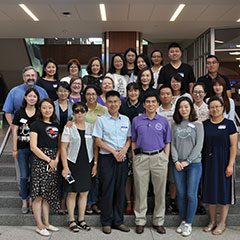
Located in Yinchuan, China, Ningxia University is comprised of more than 15,000 undergraduate and 1,300 graduate students. K-State associate dean for academic programs Chwen Sheu and professor of economics Bill Blankenau have previously visited and presented at Ningxia University, and in 2017 an agreement was signed making the two universities "sister schools."
From July 25-27, the group attended five presentations from K-State on the topics of data analytics, entrepreneurship, finance, national culture and management, and managerial economics. They also took part in facilities tours at K-State and nearby businesses, and had the opportunity to interact with representatives from the International Program Office and the Graduate School, as well as numerous K-State students, faculty and staff in the College of Business.
"Ningxia University is one of the international sister schools the College of Business has been working very hard to develop a long-term relationship with," Sheu said. "The fact that the school sent so many students and faculty to visit us this summer indicates the level of trust we have successfully built with them. Moving forward, we plan to engage in more academic collaboration — including short-term visits, joint degree programs and student exchanges."